Kim Song Ahrd2009
This study examined how individualistic-collectivistic orientation moderates the relationship between trust and cooperation intention. Data was collected through an online survey of 321 employees from two Korean companies. The findings supported both hypotheses: 1) the effect of affect-based trust on cooperation intention depends on individualism-collectivism levels, and 2) the effect of cognition-based trust also varies by these cultural tendencies. Specifically, cooperation intention was higher when trust was high for more collectivistic individuals. The implications are that understanding cultural values can help foster cooperation and team dynamics. However, the study had limitations such as response rate and not measuring actual behavior.
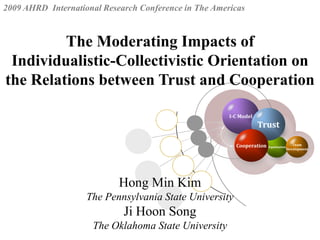
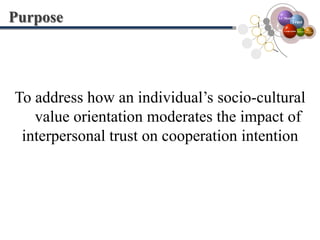
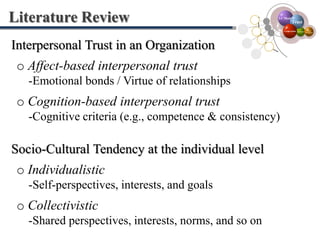
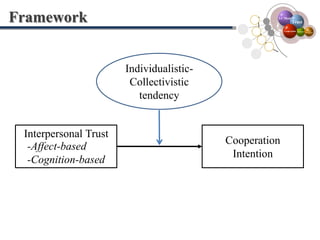
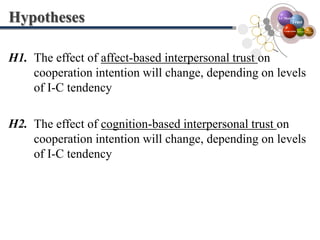
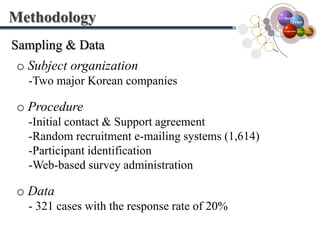
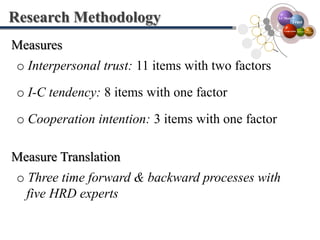
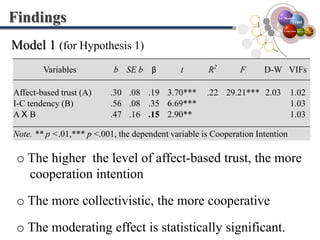

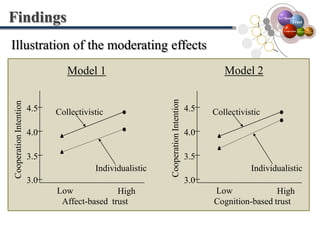
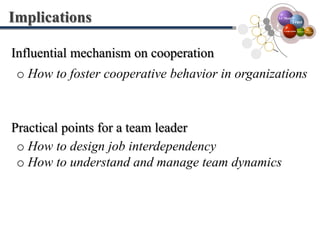
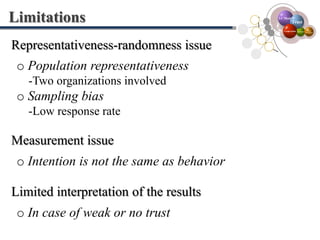
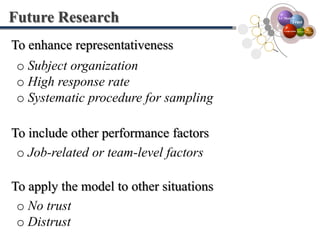
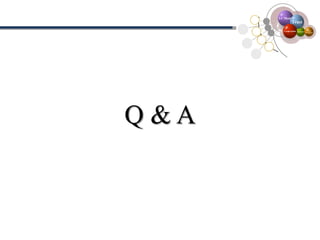
Recommended
More Related Content
Similar to Kim Song Ahrd2009 (20)
Recently uploaded (20)
Kim Song Ahrd2009
- 1. 2009 AHRD International Research Conference in The AmericasThe Moderating Impacts of Individualistic-Collectivistic Orientation on the Relations between Trust and CooperationI-C ModelTrustCooperationOrganizationTeamDevelopmentHong Min KimThe Pennsylvania State UniversityJiHoon SongThe Oklahoma State University
- 2. PurposeI-C ModelTrustTo address how an individualŌĆÖs socio-cultural value orientation moderates the impact of interpersonal trust on cooperation intentionCooperationOrganizationTeamDevelopment
- 3. Literature ReviewInterpersonal Trust in an OrganizationAffect-based interpersonal trust -Emotional bonds / Virtue of relationshipsCognition-based interpersonal trust -Cognitive criteria (e.g., competence & consistency)I-C ModelTrustCooperationOrganizationTeamDevelopmentSocio-Cultural Tendency at the individual level Individualistic -Self-perspectives, interests, and goalsCollectivistic -Shared perspectives, interests, norms, and so on
- 4. FrameworkIndividualistic-Collectivistic tendencyI-C ModelTrustCooperationOrganizationTeamDevelopmentInterpersonal TrustCooperation Intention-Affect-based-Cognition-based
- 5. HypothesesThe effect of affect-based interpersonal trust on cooperation intention will change, depending on levels of I-C tendencyH1.I-C ModelTrustCooperationH2.The effect of cognition-based interpersonal trust on cooperation intention will change, depending on levels of I-C tendencyOrganizationTeamDevelopment
- 6. MethodologySampling & Data Subject organization -Two major Korean companies Procedure -Initial contact & Support agreement -Random recruitment e-mailing systems (1,614) -Participant identification -Web-based survey administration Data - 321 cases with the response rate of 20%I-C ModelTrustCooperationOrganizationTeamDevelopment
- 7. Research MethodologyMeasures Interpersonal trust: 11 items with two factors
- 8. I-C tendency: 8 items with one factor
- 9. Cooperation intention: 3 items with one factorI-C ModelTrustCooperationOrganizationTeamDevelopmentMeasure Translation Three time forward & backward processes with five HRD expertsFindingsModel 1 (for Hypothesis 1)I-C ModelTrustCooperationOrganizationTeamDevelopment The higher the level of affect-based trust, the more cooperation intention
- 10. The more collectivistic, the more cooperative
- 11. The moderating effect is statistically significant.FindingsModel 2 (for Hypothesis 2)I-C ModelTrustCooperationOrganizationTeamDevelopment The higher the level of cognition-based trust, the more cooperation intention
- 12. The moderating effect is statistically significant.FindingsIllustration of the moderating effectsI-C ModelModel 2Model 2Model 1Model 14.54.5CollectivisticCollectivisticTrust4.04.04.54.5Cooperation IntentionCooperation IntentionCollectivisticCollectivisticCooperationOrganizationTeamDevelopment3.53.54.04.0Cooperation IntentionIndividualisticIndividualisticCooperation Intention3.03.03.53.5LowLowHighHighIndividualisticIndividualisticAffect-based trustCognition-based trust3.03.0LowLowHighHighAffect-based trustCognition-based trust
- 13. ImplicationsInfluential mechanism on cooperation I-C Model How to foster cooperative behavior in organizationsTrustCooperationPractical points for a team leaderOrganizationTeamDevelopment How to design job interdependency
- 14. How to understand and manage team dynamicsLimitationsRepresentativeness-randomness issue Population representativeness -Two organizations involved Sampling bias -Low response rateI-C ModelTrustCooperationOrganizationTeamDevelopmentMeasurement issue Intention is not the same as behaviorLimited interpretation of the results In case of weak or no trustFuture ResearchTo enhance representativeness Subject organization
- 15. High response rate
- 16. Systematic procedure for samplingI-C ModelTrustCooperationOrganizationTeamDevelopmentTo include other performance factors Job-related or team-level factorsTo apply the model to other situations No trust
- 17. DistrustI-C ModelTrustQ & ACooperationOrganizationTeamDevelopment
